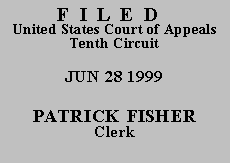

| HILTON LAWRENCE BROWN, | No. 99-3012
(D.C. No. 98-CV-3305) (Kansas) |
Hilton Lawrence Brown, a pro se prisoner, appeals the dismissal of a petition for writ of habeas corpus pursuant to 28 U.S.C. § 2241, which he filed against the Warden of the California facility in which he is incarcerated. Mr. Brown has moved to proceed in forma pauperis on appeal.
Mr. Brown offered the district court a number of documents ranging from information on military discharge to his correspondences with the California State Bar Association, the entirety of which the district court liberally construed as either a request to transfer out of the California facility or to change the venue or one or more legal actions to the District Court of Kansas. The court then dismissed Mr. Brown's petition for lack of jurisdiction and lack of any viable claim for habeas corpus relief.
We review a district court's dismissal of a habeas corpus petition de novo. See Bradshaw v. Story, 86 F.3d 164, 166 (10th Cir.1996). "A petition under 28 U.S.C. § 2241 attacks the execution of a sentence rather than its validity and must be filed in the district where the prisoner is confined." Id. Mr. Brown has alleged a number of inequities ranging from the overpricing of Reebok goods to inappropriate financial charges made by the Atascadero State Hospital for payment of Mr. Brown's electro-shock treatment. In so doing, he has presented no intelligible argument attacking the execution of his sentence or challenging the district court's dismissal. The district court properly dismissed his claim.
Because he fails to offer any reasoned, nonfrivolous argument on the law and facts in support of the issues he raises on appeal, see 28 U.S.C. § 1915(e)(2)(B)(1), we deny his motion to proceed on appeal without prepayment of costs or fees.
The appeal is DISMISSED, and the mandate shall issue forthwith.
ENTERED FOR THE COURT
Stephanie K. Seymour
Chief Judge
*.This order and judgment is not binding precedent, except under the doctrines of law of the case, res judicata, or collateral estoppel. The court generally disfavors the citation of orders and judgments; nevertheless, an order and judgment may be cited under the terms and conditions of 10th Cir. R. 36.3.